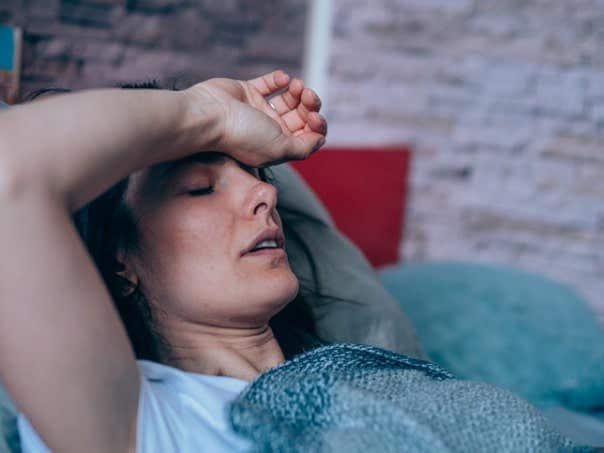Sleep Health
Published February 1, 2022
9 minNight Sweats: Causes, Treatments & Prevention
Sweating is a routine occurrence and a central part of our body’s temperature regulation mechanism. Sweating profusely is plausible while you are in a sauna or toiling hard in the gym. But, waking up

Table of contents
What Are Night Sweats?Are Night Sweat And Hot Flashes Different?Are Night Sweat And Hot Flashes Different?Symptoms Of Night SweatsHow Are Night Sweats Treated?When To See A DoctorHow To Prevent Night SweatsSumming Up…Frequently Asked Questions
Sweating is a routine occurrence and a central part of our body’s temperature regulation mechanism. Sweating profusely is plausible while you are in a sauna or toiling hard in the gym. But, waking up in the middle of the night, drenched in sweat, is a completely different thing. Night sweats can be described as sweating more than what is needed for regulating the body’s temperature at night.Night sweats can start while sleeping and without any physical exertion. They aren’t caused by thicker blankets or warmer bedrooms. Instead, other underlying illnesses & hormonal imbalances may be responsible for night sweats. Night sweats deteriorate sleep quality, affect your bed partner, and cause serious discomfort. As a result of which, it's natural for you to be inquisitive about the causes of night sweats and how they can be prevented.
What Are Night Sweats?
Night sweats aren’t just normal sweating during the night, it's an abnormality. Night sweats are episodes of mild to profuse sweating occurring during night hours. The sweating may get so intense that it may drench your clothes and bedding. People have described experiences of night sweats as feeling as though they’ve plunged into a pool of water. Night sweats are contingent upon underlying conditions and thus can occur in a comfortably cool room as well.Consult a doctor and seek medical help if you too experience night sweats, and your bed sheets and pillows become saturated and difficult to sleep on.Are Night Sweat And Hot Flashes Different?
An abrupt rise in body temperature is called hot flash. Hot flashes have no fixed time for occurrence and can occur at any time, and whenever they occur, they trigger heavy perspiration, categorized as night sweats.In some contexts, night sweats are also known as hot flushes that occur at night. Flushing is a reddening of the face and skin due to high blood flow. While night sweats can follow flushing, flushing itself doesn’t cause intense sweating.Are Night Sweat And Hot Flashes Different?
An abrupt rise in body temperature is called hot flash. Hot flashes have no fixed time for occurrence and can occur at any time, and whenever they occur, they trigger heavy perspiration, categorized as night sweats.In some contexts, night sweats are also known as hot flushes that occur at night. Flushing is a reddening of the face and skin due to high blood flow. While night sweats can follow flushing, flushing itself doesn’t cause intense sweating.Symptoms Of Night Sweats
The symptoms associated with night sweats rely on the underlying condition that’s causing it. Let’s read about some symptoms of the same:- Night sweats can occur as a side effect of an existing medication.
- Fever can be a reason for sudden experiences of shaking and chill while sleeping.
- Cancers (leukemia and lymphoma) and certain infections.
- Some women transitioning into menopause also complain of excessive perspiration combined with other signs such as dryness of the vagina, mood swings, and hot flashes during the daytime.
- Abrupt loss in weight.
How Are Night Sweats Treated?
Night sweat treatment is a subjective matter. It may be different for each patient; thus, it must always be treated under the supervision of a practitioner. However, medication, cognitive-behavioral therapy (CBT), and changes in environment and behavior are notable mentions among the possible treatments for the same.Medications
Taking medications for underlying medical conditions such as diabetes or hyperthyroidism may cause excessive sweating while sleeping. Consider changing your dose timings or replacing the medication altogether to observe a change.Sometimes there’s an infection such as tuberculosis or hormonal imbalance, that’s the reason for sweating at night. Taking medicines for the infection or hormonal therapy can help with relieving symptoms. Visiting the doctor is the best resort to know about the pros and cons of treating night sweats with medicines.CBT
CBT or Cognitive Behavioral Therapy is a kind of talk therapy used to treat health conditions such as insomnia, depression, or anxiety. Despite several self-directed programs available online, it's best to visit a counselor or psychiatrist in person for the therapy.Studies suggest that CBT is quite effective in decreasing the frequency of night sweats and also improves mood and behavior in menopausal women. The compatibility of CBT with other treatments, like behavior modification, increases its effectiveness when combined with the latter.Lifestyle Modification
Lifestyle modifications are a simpler way to treat night sweats. Tiny changes such as reducing intake of caffeine and alcohol, avoiding spicy food, drinking plenty of water, practicing relaxation techniques, and wearing breathable outfits to bed are potential lifestyle modifications that can be tried out.When To See A Doctor
Having night sweats once in a blue moon is usually not a worrisome matter. But do talk to your doctor if you’re having night sweats and related symptoms quite often. These might inter-alia include chills, fever, ache, and unusual decrement in body weight.Noting down the frequency, duration, and associated symptoms during the episodes of sweating will help your doctor find the actual cause behind your sweating.How To Prevent Night Sweats
Maintaining a healthy lifestyle can reduce the risk of suffering from night sweats. Simpler modifications such as changing eating habits, changing the way you dress, and avoiding harmful substances like intoxicants, can be surprisingly effective in providing relief. Below are some actions you can take that also includes home remedies for night sweats:- Have a diet full of phytoestrogens and vitamin E and B12 as they help stabilize the hormonal level.
- Focusing on low-impact exercises as increased intensity of your exercise can increase night sweats.
- Sleep in loose, breathable nightwear so that sweating in normal amounts evaporates and doesn't interrupt your sleep.
- Keep a check on alcohol and caffeine consumption as they have antidiuretic characteristics that reduce the kidney’s water reabsorption abilities.
- Avoid using tobacco and drugs as excessive consumption of the same may result in night sweats in the form of side effects.
- Sleep in a cooler setting as it will help your body remain cool and sweat less.
- Try to maintain your weight as a reduction in weight has proven positive effects on efforts to reduce night sweats.
- Avoid spicy foods, especially if you have menopause, as it can worsen your night sweats.











